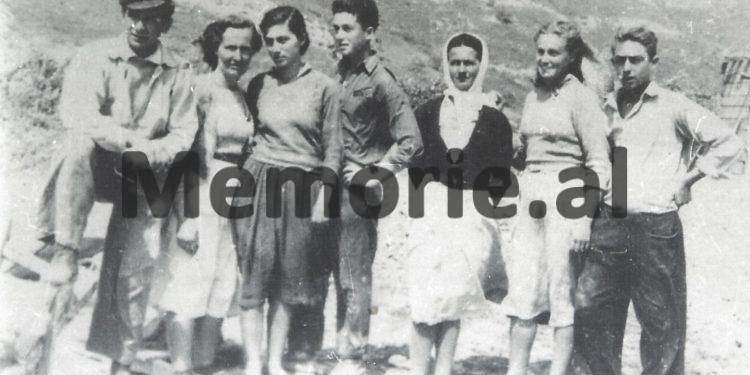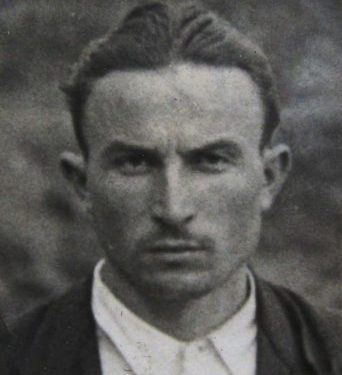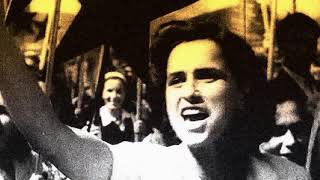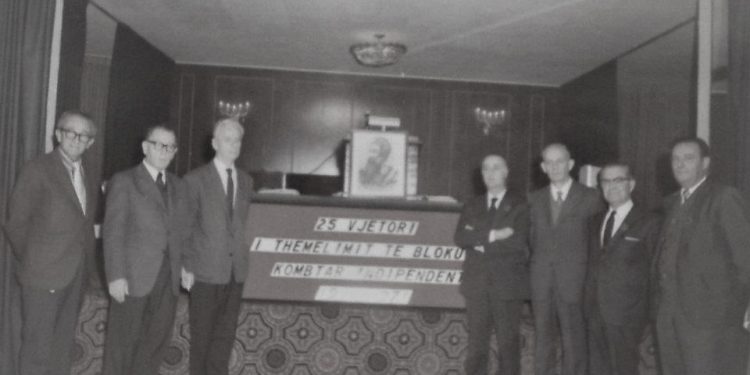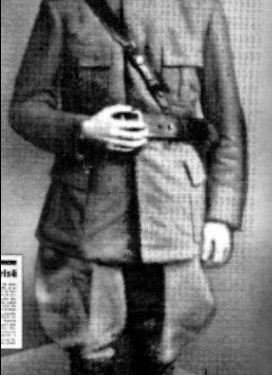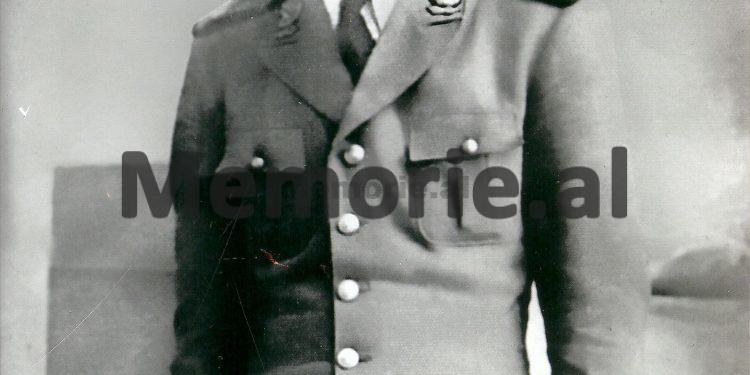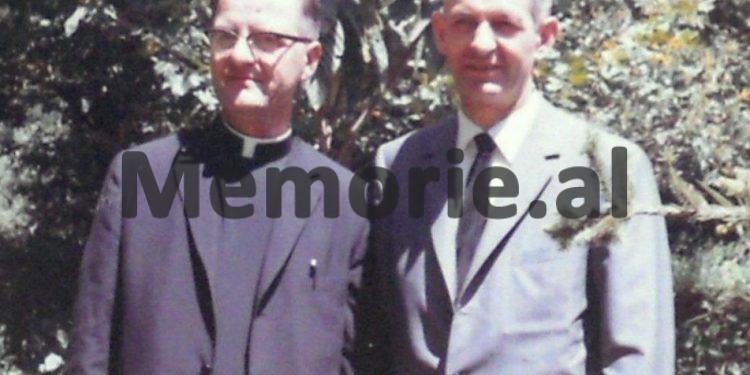Dashnor Kaloçi
Memorie.al publishes the unknown story of the event that happened on August 7, 1949, where in the place called Qafa e Valmerit, from an ambush organized by the organization “Lidhja Kombëtare e Maleve” headed by Ndue Pjetër Gjonmarkaj, he was killed Bardhok Biba, who at that time held the position of the first secretary of the Party Committee of the district of Mirdita and the Deputy of the People’s Assembly of that province. From the middle of 1945, he was charged with the duty of the head of the Sub/Section of the State Security of the Mirdita district, a duty which he held until the end of 1946 and in January 1947, he was released from that function, after being appointed to the District Executive Committee. It was August 7, 1949, when in the mountains of Mirdita, in the place called Qafa e Valmirit, at two o’clock in the afternoon, the First Secretary of Mirdita district and deputy of the People’s Assembly, Bardhok Biba, was killed by an ambush.
Who was Bardhok Biba?
Bardhok was born on January 28, 1920 in the Bulshar village of Oroshi, a village not far from him, at that time there were the palaces of the Captain of Mirdita, Gjon Markagjon, with whom Bibë Marku, Bardhok’s father, was a close cousin. The great door of Gjonmarkaj, otherwise known as Princes of Mirdita, since the time of Turkey, was divided into three branches (tribes). According to several studies and various testimonies, one branch of that tribe was the one represented by Preng Bib Doda, (Pasha) who in 1914 in the government of Prince Vid, held the portfolio of the Minister of World Affairs. This branch died out, as Preng Bib Doda left no heirs.
The second branch of the Gjonmarkajs was the one known as Black Wool, whose successor was Gjon Markagjoni, the captain of Mirdita located in Orosh, which was the only branch of that tribe that continued the legacy as a family the first of Mirdita. And from the third branch of the Gjonmarkaj tribe, came Bibë Marka Kola, the father of Bardhok Biba, who, although he was a very poor family, was known as a descendant of the Gjonmarkaj.
The house of Bibë Marka Kola, with his cousins Gjonmarkaj, were constantly in conflicts, which had started since the time of Turkey, when Gjonmarkaj alone inherited the Mirdita priory. One of the reasons for this silent conflict between the two families that flow from the same chimney, among others, is said to have been the exile that the Turks did to Bibë Marka Kola, from whom Gjon Markagjoni received the title of Capedan of Mirdita.
The Gjonmarks send Bardhok to school
With the help of his cousins, Gjonmarkaj, who at that time had opened and helped with their own expenses, the Oroshi Boarding House, Bibë Marku, was able to arrange his son Bardhok, to continue primary school in that village. After finishing this school, with the help of Gjonmarkaj, in 1934, Bardhoku was able to receive a state scholarship from the government of King Zog, to continue high school in the “Malet Tona” dormitory in the city of Shkodra.
In that gymnasium, Bardhoku first became acquainted with communist ideas, which had begun to spread in the city of Shkodra since 1935, when some communists of the orthodox faith from Montenegro brought there Bolshevik literature, which was embraced by a a very small part of the school youth of that city, such as: Emin Duraku, Xheladin Hana, Tom Kola, Nazmi Rushiti, Hajdar Dushi, Ibrahim Sako, etc.
They were also influenced by Vasil Shanto and Qemal Stafa, since their trial in 1938, when the Shkodra youth group ‘Communist Group of Shkodra’, led by Zef Mala, was discovered and arrested. According to the documents that are in the history of the high school of Shkodra, the name of Bardhok Biba, together with Tom Kola, was on the lists of those who would be arrested, but it is not known why that list was not executed by the relevant bodies.
Expelled from school as a communist
After that, on February 19, 1940, Bardhoku interrupted his studies in the fourth year, because he was expelled from school for communist and anti-fascist activities, after he had been arrested once before. As a punitive measure for his activity, he was sent to his native village of Bulshar, to be kept under the supervision of the gendarmerie. Even after being forced to go to his village, Bardhoku did not cut ties with his friends of the Communist Group of Shkodra, where he often left secretly and went to meet them.
Since the creation of the first partisan cell of Mirdita, at the end of 1943, which was created according to the order of the Communist District of Shkodra, which was commanded by Mat Doda and Pashko Curri, Bardhok Biba was included in that small formation, which consisted of of seven-eight people, with commissioner Nuri Llazan, the envoy of the Communist Circle. From the beginning of October 1944, some Northern Bajraktars, together with the main exponents of the nationalist forces of the ‘National Front’ and ‘Legality’, gathered in a village of Mirdita and formed the “Link of the Mountains”, which was an organization that would deal with the anti-communist resistance.
This “Link” had as its main task to prevent the penetration of the partisan forces in the offensive, which they had taken to Northern Albania. The “Connection of the Mountains”, from its beginnings, was under the attack of the partisan forces, where Bardhok Biba played a key role, as one of the leaders of the partisans who knew well the situation and the terrain in that province.
Towards the end of 1944, one of the events that made a big fuss on the eve of the end of the War, was the burning of the Gjonmarkaj’s sarajs (towers) in Orosh, by the partisan brigades coming from the South of the country. The burning of Gjonmarkaj’s houses, at that time by the anti-communist forces led by Gjon Markagjoni, was also attributed to their cousin Bardhok Biba, who had become the number one communist and commissar of the partisans of Mirdita’s detachment.
Deputy and First Secretary of Mirdita
The end of the war found Bardhok, one of the main leaders of the few mirditor partisans, who were included in the ranks of the communist brigades. With this indisputable authority that he had among the few educated cadres that Mirdita had at that time, he was appointed Commissar of the Country Command and was given the rank of lieutenant. He held this position until the middle of 1945, when he was charged with the duty of the head of the Sub/Section of the State Security of the Mirdita district. Bardhoku held this position until the end of 1946 and in January 1947, he was released from that position, after being appointed to the District Executive Committee.
Similarly, in 1947, Bardhoku was proposed as a deputy of Mirdita in the People’s Assembly, after Zef Haxhisa, who was elected as a deputy in the elections of December 2, 1945, was stripped of his mandate. According to the official version that was given about Zefi at that time, he had not justified the trust that the people of Mirdita gave him. After his removal, elections were organized, where Bardhoku won the right to enter the People’s Assembly as a deputy, proposed by the Democratic Front (although it was the only candidate) represented by the Communist Party.
After that, on May 12, 1949, when the Communist Party Conference was held for Mirdita, Bardhoku was elected First Secretary of the district. From the end of the War at the end of 1944 and continuing when Bardhoku was with the main duties in Mirdita, he encountered great problems, since the anti-communist resistance forces operated in that area, led by his cousins Gjonmarkaj, of who considered him as their main enemy. At that time, in the mountains of Mirdita, there were several armed attempts between the communist forces of the Defense Division and those of the anti-communist resistance, led by Gjonmarkaj, in which there were casualties on both sides.
From these efforts, until 1949, some of the main leaders of the anti-communist resistance were killed, including the two brothers Mark and Llesh Gjonmarkaj, the sons of Gjon Markagjon, the Captain of Mirdita, who had left Albania in November 1944 and had settled in Italy, with part of his family. In addition to these murders, a large part of Mirdita families, who had people who escaped to the mountains and others who were suspected of harboring anti-communist forces, or as they were otherwise known at the time “of the reaction”, were interned in the Tepelena camp. So, as above, Bardhok Biba was between “two fires”: On the one hand, from the official Tirana, who asked him to extinguish the anti-communist resistance in the district of Mirdita, where he was the First Secretary of the Party Committee, and on the other hand, the Mirditors and his relatives, who were looking for help and protection, from the constant reprisals and attacks, which the communist regime undertook, against that province!
How did Bardhok’s murder happen?
After the murder of the two Gjonmarkaj brothers, their place at the head of the “Lidhja Kombëtare e Maleve” organization, which was still continuing the resistance in the mountains of Mirdita and beyond, was taken by Ndue Pjetër Gjomarkaj, who was Bardhok Biba’s second cousin? This organization, accusing Bardhok Biba as the main cause of murders and terror, which was undertaken against their forces and the families who had sheltered them, decided to kill him. So on August 5, 1949, one of the members who were connected to the anti-communist resistance forces, discovered Bardhok’s secret trip to Kačinar and Simon villages, where he would go for party conferences.
On those trips, Bardhok was accompanied by his relative, Pal Gjoka, and a local policeman named Dodë. Regarding this, Ndue Mëlyshi, one of the main exponents of the anti-communist resistance, (parachuted twice from the foreign discoveries in the mountains of Mirdita), in his memoirs published in 1970 in the USA, where he was as a political emigrant, among other things, he writes: “Our meeting, after taking the second decision to kill Bardhok Biba, prepared the concrete plan, together with the letter-decision signed by the president of that time, Ndue Pjetër Gjonmarkaj. After that on 7 August 1949, in Qafë i Valmir, at two o’clock in the afternoon, the payback body carried out the murder of Bardhok”.
The murder of the deputy and the First Secretary of Mirdita caused a great stir in Tirana, where the Political Bureau of the Central Committee of the Communist Party of Albania was called to an extraordinary meeting, where everyone discussed and made the relevant decisions, how action would be taken on the event that had occurred.
The revenge of the communist leadership, for the murder of Bardhok
After Bardhok Biba’s murder, the government of Tirana was extremely alarmed and immediately ordered the organization of a punitive operation of large proportions, never seen before. This operation was placed directly under the command of General-Colonel Mehmet Shehu, who at that time was in the post of Minister of Internal Affairs, as well as his two advisors, Soviet colonels, Sovolovski and Voleskin. In charge of the punitive operation, Mehmet Shehu, arrived in Mirdita on the 10th of August and stayed there until the 18th of that month. During this period of time, the military forces of the punitive expedition headed by him, arrested hundreds of people, where most of them were sent to the city of Shkodra, while those they considered the most important, were kept in the Security Section of Mirdita district.
Just a few days after the funeral ceremony of the burial of Bardhok Biba, where the coffin was carried by Mehmet Shehu with General Gjin Marka Toma, the punitive expedition reinforced with the forces of the People’s Protection Brigades, on August 18, exactly at the Valmir Pass, there where Bardhok Biba was killed, executed 14 men from Mirdita e Kthella. This execution was done in the presence of the inhabitants of those villages, who had been forcibly gathered there by the military forces, in order to terrorize them. Four people were hanged on the rope, while ten others were shot.
The fourteen executed were: Llesh Mëlyshi, Nikoll Bardhok Bajraktari, Bardhok Dodë Lleshi, Gjergj Keq Belshi, Dodë Marka Biba, (from Kthella) Dede Preng Gjomarkaj, Nikkol Llesh Nikolli, Preng Shkurt Nikolli, Gjin Kaçi, Ndoc Gjetpalaj, Frrok Mata, Mark Ndrec Marku, Dede Paloka and Zef Vila from Mirdita. According to archival documents discovered in recent years, (the letter of the prosecutor Bilbil Klosi, sent to Enver Hoxha and the Secretariat of the Central Committee of the ALP), for the execution of 14 prisoners, approval was given by Enver Hoxha himself, during a telephone communication with Prosecutor Bilbil Klosi.
According to many eyewitnesses who still live today in the district of Mirdita, as well as the memoirs of some of the main exponents of the Albanian political emigration, published in the West (such as Nikoll Mëlyshi and Ndue Mëlyshi), Llesh Mëlyshi was tortured very severely and still his soul came out, the Pursuit Forces tied him with ropes, hands and feet, behind Mehmet Shehu’s car and dragged him along the entire causeway, from Rrëshen to the Fan bridge and back to the sub-prefecture, approximately 10 km. After the execution, all those killed were thrown into a large common pit. From the pit where they had been thrown, some of the executed, who had not yet recovered, asked the pursuing forces to shoot them again, before covering them with dirt, thorns and stones.
On those same days, the military forces leading the operation carried out reprisals throughout Mirdita, violently taking nearly 500 people, men, women, old people and children, who beat them barbarically. About 300 of them were sent to the prisons of Shkodra, while dozens of others were initially sent to the district of Lezha, and then to Krujë, Berat, to end up in the Tepelena Camp. It is said that General Mehmet Shehu told Bardhok’s father: “Don’t worry, I will shoot 200 men, as a sign of revenge for our friend”, but Bib Marku replied: “I don’t need to do that work, that it’s not Mirdita’s fault”!
The punitive operation in Mirdita, headed by Mehmet Shehu, is not known how long it would have lasted, if the riots on the Southern border with Greece had not started, which from the propaganda and historiography of the communist regime of Enver Hoxha, are now known as “Provocations of August ’49”. On August 18, 1949, Enver Hoxha ordered General Mehmet Shehu to stop the operation in Mirdita, because serious provocations had begun in Mount Gramoz, after the Greek government of Prime Minister Caldaris attacked the “red rebels”, as the army was known of General Markos Vafjadhis, who took refuge inside the Albanian territory, having the unsparing help of the government of Tirana and also other countries of the Communist East, led by the Soviet Union of that time.
Why was Bardhok Biba killed?
Regarding this murder, Ndue Mëlyshi, one of the main exponents of the anti-communist residence, in his memoirs, among other things, writes: “Bardhok Biba was killed because he was a notorious communist and as a young man, he plunged deeply into crimes and mistakes , lied to by the satraps of Tirana. He, not having the experience of political life, became a tool in their hands. Bardhoku became a man of great influence among the communists and as long as he was alive, he played several roles that the satraps of Tirana, your soul were satisfied. As the deputy of Mirdita, he worked very diligently to suppress that province. Therefore, the end came to him badly and he disappeared from this world, without being able to take the place of Gjon Markagjon, whom he craved so much”.
Similarly, for the murder of Bardhok Biba, from that time onwards, various hypotheses have been put forth. It has been said that official Tirana also had a hand in his murder, which wanted a reason to severely attack and terrorize Mirdita, since a large part of the anti-communist resistance, which was connected and financed by Foreign Intelligence, was operating there at the time , headed by the CIA.
It is also said that before the decision was taken to kill him, by the leaders of the “National Union of Mountains” organization, there were many debates, not to carry out that murder, as it was known that the communists would terrorize Mirdita, but The head of “Lidhje”, Ndue Pjetri, insisted on the execution, which one of the members of the group asked him to do, who accused Bardhok Biba of killing his son and had sworn that: “he would not leave Albania, without taking away his son’s hack, taking Bardhok to him…”! All this made Ndue Pjetri approve the death sentence of Bardhok Biba, because, among other things, “Gjon Marka Gjoni in Italy would be pleased when he found out about the murder of the man who had burned down the palaces in Orosh and killed two sons, Markun and Lleshin”. However, all these remain hypotheses, but one thing is certain, that after Bardhok’s murder, all of Mirdita was subjected to an unprecedented terror and official Tirana kept it suppressed, until 1991, when the communist regime collapsed. Memorie.al




